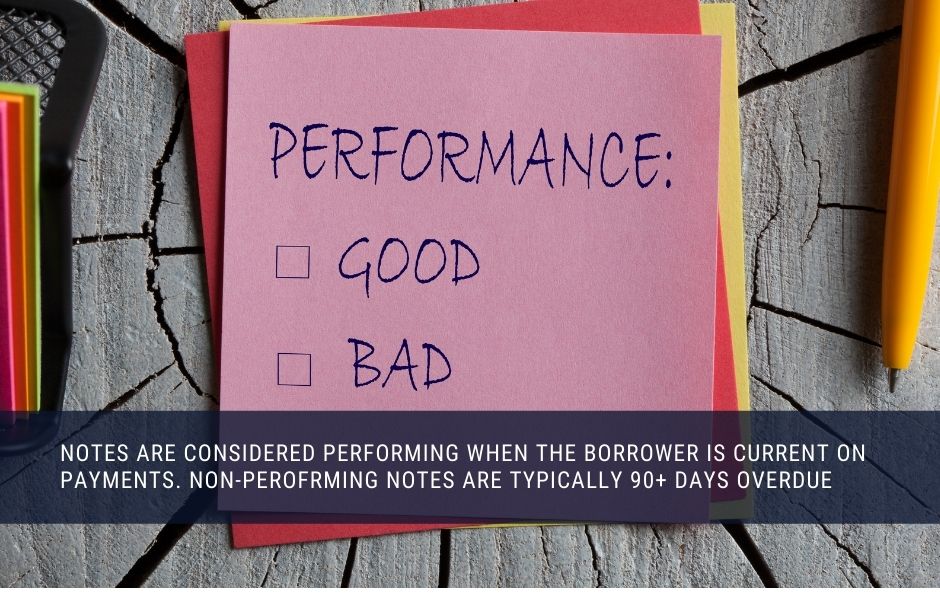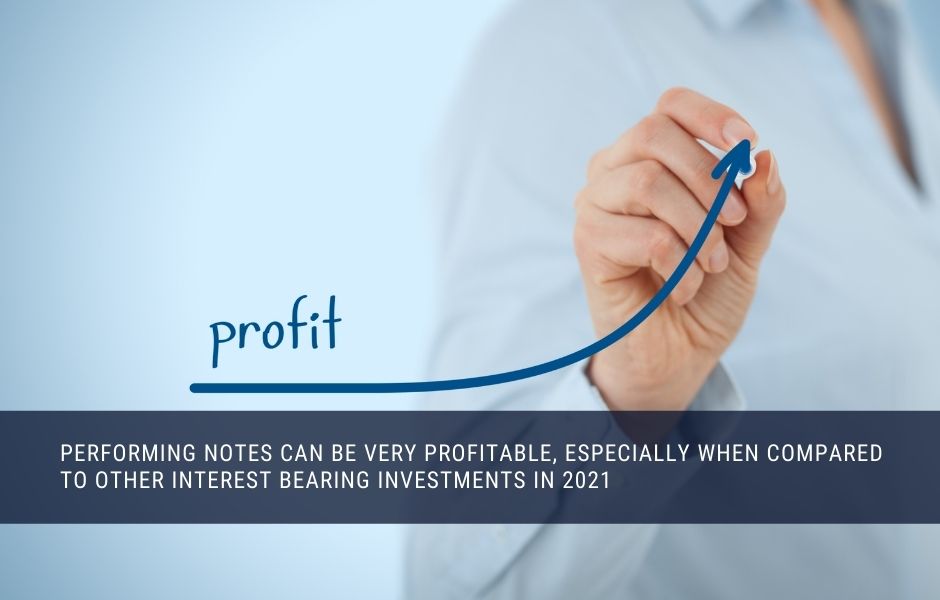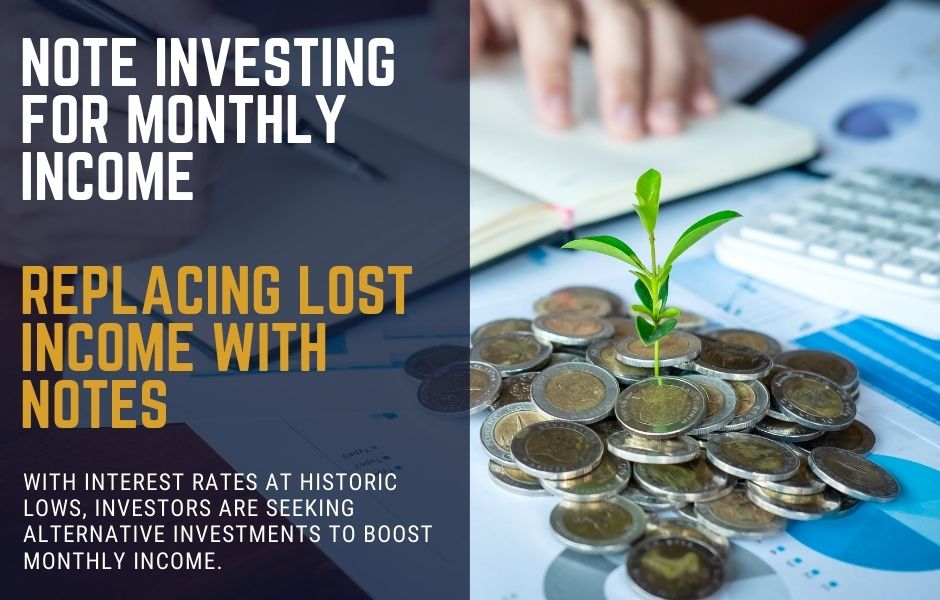Note Investing for Monthly Income

David Garner
Note Investing for Monthly Income
With interest rates at historic lows, investors are seeking out alternative investments capable of replacing lost income. And if you are specifically looking for investments that pay income on a monthly basis, then your choices are even more limited.
In this article we take another look at real estate notes, and how they might fit into a retirement account or investment portfolio geared towards producing stable monthly income at a better rate.
Contents:
- What are Real Estate Notes
- Where You Can Buy Mortgage Notes
- What Type of Notes Should You Buy
- What Kind of Monthly Income Can You Expect?
- Are Real Estate Notes Risky?
- More Note Investing Articles
Remember, this is not a recommendation to invest. Everyone’s situation is unique, and you should only invest based on your own goals, timeline and tolerance for risk. Never invest more in any one asset that you are not prepared to lose. With that said… let’s get started.
What Are Real Estate Notes
First, let’s get our terminology straight. When I refer to real estate notes, I use the term interchangeably with ‘mortgage note’, and just simply, ‘note’. In fact, when we are referring to a note in the world of real estate, we actually mean a promissory note and a lien. But we’ll get to that in a minute.
A note is simply a contract between a borrower and a lender. Each note defines the amount of the loan, interest rate and maturity date, along with a bunch of other important stuff which varies widely from note to note. It’s all basically the terms and conditions for the loan.

The lien is a Deed recorded in the County records on the title to a piece of real estate owned by the borrower. This is usually a mortgage deed of deed of trust depending on which State the real estate is located in. The lien provides security for the loan. If the borrower defaults on the loan, the lender can foreclose and force the sale of the real estate and the lien is settled, effectively (hopefully) repaying the lender.
There’s a bit more to understand about liens. Some liens are settled before others if a property is sold, and that can drastically change the amount of risk attached to a particular note investment. You can read more about lien position and priority here. For now, let’s take a look at the market for buying and selling real estate notes.
Related: What is A Note – A Guide to Promissory Notes for Investors
Where You Can Buy Real Estate Notes
In the US, note investing is big business. Mortgage notes are freely traded on a huge secondary market. Lots of lenders that originate mortgage loans then sell them to create liquidity. Lenders also sometimes sell notes when the borrower has defaulted. These are called non-performing notes. We’ll talk more about them later.
Because anyone can buy and sell real estate notes, they are used by both private and institutional investors as a tool to produce monthly income. I have bought and sold notes since 2010, and I also use notes everyday to help fund acquisitions for our affordable housing programs.

There are plenty of places you can buy real estate notes. There are online platforms where other investors list their notes for sale. And there are brokers, hedge funds, as well as banks, credit unions and other originating lenders that sell notes.
But while there is no shortage of real estate notes for sale, finding good quality paper at a good price is more difficult than one might imagine. Often brokers will buy note cheap from banks, then park up the trash they don’t want to keep and sell them on to other investors at an inflated price.
The key is to do your research and stay informed. If you want to see details of new notes for sale every Thursday, you can join 5’000 note investors and private lenders on our Priority Investor Email List.
Related: Mortgage Notes For Sale – A Complete List of Mortgage Note Sellers
Which Notes to Buy for Monthly Income
There are many different types of notes. In terms of income-producing capacity, there are performing notes, non performing notes and reperforming notes. Form a security and risk perspective, there are 1st position, 2nd position loans. And notes from different types of seller, including institutional notes, seller finance notes and private lending notes to name a few. As we are focussing on monthly income today, that narrows down the type of notes you should be looking to buy.

First off, you want either performing or reperforming notes. these are notes where the borrower is up to date on making monthly payments, or they have started paying again after a period of default. These are the notes that produce immediate monthly income, and that’s what you need, right?
You will find plenty performing notes from the following sources:
Note Brokers and Investors
These guys are other note investors. They actively buy and sell notes. You will find brokers that buy in bulk, mark up the price, and then resell in smaller packets. And you will find note investors that have bought non-performing notes, got them reperforming, and are now selling to exit their investment.
Real Estate Investors
RE Investors are a great source of income-producing notes. I for one sell performing notes to income-focussed investors all the time through our Private Lending Program. RE investors also sell their completed properties to buyers and carry a note. This is known as seller financing, and the RE Investor will often seek to sell the note to create liquidity.
Other considerations after note performance are lien position & priority, borrower quality, and the quality of the real estate securing the loan. All of these factors play a part in defining your overall risk, and we’ll talk about that at the end of this article.
What Kind of Monthly Income To Expect
The returns to real estate note investing in general are so wide there really isn’t any credible range to state. If you are looking purely at performing notes however, the band is somewhat narrower.
Every note is different, and the two main variables that define your expected income and returns are the interest rate of the loan, and the discount you purchase the loan for. yes, that’s right… discount! You see, often notes are traded at a discount to the unpaid balance. that means you could buy a $100,000 loan for maybe $95,000. So not only do you get interest on $100,000, the borrower also repays $100,000, even though you only paid $95,000.

As with any investment, the interest rate on a note is usually defined by the amount of risk attached to the loan. If it’s a particularly risky loan with a shaky borrower, not much equity in the house and a 2nd position lien, you might find interest rates as high as 15% or more.
A loan in 1st position with a great borrower and solid real estate with lots of equity might have a rate as low as 1% in today’s market. But that’s pretty rare for anything other than institutional bank originated paper.
So remember, the interest rate is your compensation for the amount of risk you’re taking. Although notes with a higher rate of interest may seem attractive at first, be prepared for a higher rate of default on those riskier loans.
As a general rule of thumb, you could expect to earn an annual return on your investment of between 8% and 10% p.a. if you are investing conservatively in good quality performing or reperforming notes, or private lending.
Is Note Investing Risky?
The real answer is of course, yes. Every investment carries risk to some degree or another. Investors tend to like real estate notes because there is an asset to sell if things go wrong. Having this physical asset as a backstop to your investment makes note investing far less risky than unsecured paper-based investment in the eyes of many.

The main risk involved in note investing is borrower default. That’s why its so important to pay attention to the quality of your borrower. Then you have issues that may arise if you have to foreclose on a note. There could be problems with the title, or the physical real estate. So note investing is certainly not risk free, but if you buy right, you can mitigate, plan for, or manage most of risk.
Conclusions and Links
So that’s it… My introduction to using real estate note investing as a tool to boost your monthly income. Remember, if you want to see new performing mortgage notes for sale every Thursday, join our Priority Investor list here. In the meantime, here are some links to other article I’ve written on Note Investing:
- Where to Buy Mortgage Notes – A Complete List of Verified Sources
- Note Investing 101 – Everything you Need to Know About Note Investing
- How to Invest in Notes – 7 Note Investing Strategies
- What is a Note and What Terms Should It Contain?
- Performing vs Non-Performing Notes – Which is the Better Investment?
- The Private Lender’s Guide to Assessing Credit Risk
- Understanding Lien Position and Priority
- How to Buy Mortgage Notes Online in 2021
- How to Assess Real Estate for note Investing and Private Lending
- Find Performing Notes for Sale in 2021
- Private Lending 101 – Everything you Need to Know About Private Money Lending
- Is Buying Mortgage Notes a Good Investment in 2021?
- Note Investing vs Rental Properties – Which is the Best Investment?
- Performing Notes – What Why and How to Buy
- Is Real Estate Note Investing Risky?
- Real Estate Notes vs REITs – Which is the Better Investment?
- The 3 Best Real Estate Investing Opportunities in 2021
- What is the Difference Between a Note and a Mortgage?
- Real Estate Notes – Everything You Need to Know
- My Top 5 Real Estate Note Investing Tools and Resources
- 3 Note Investing Funds for Passive Investors


